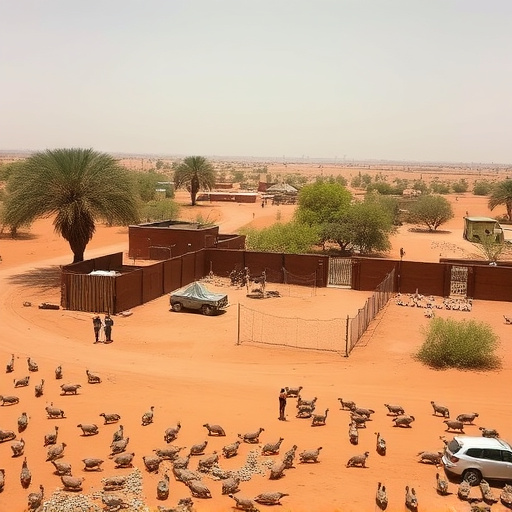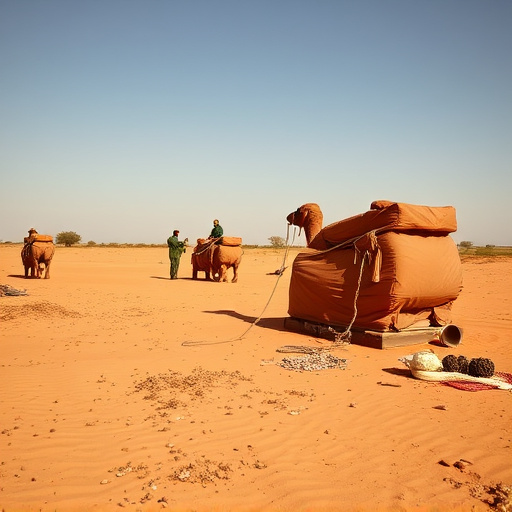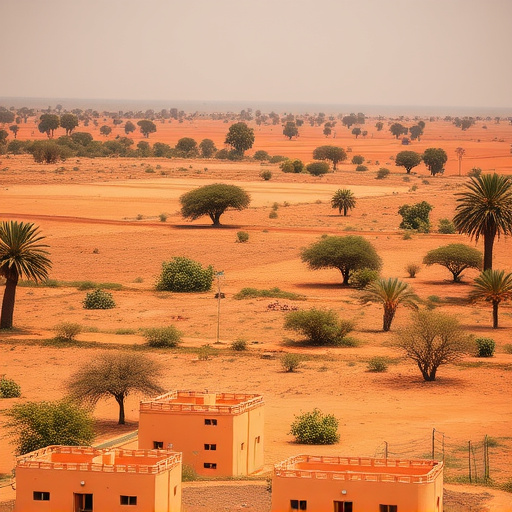Sudan's healthcare system, a blend of public and private facilities, is improving through democratic reforms and community involvement. While challenges like limited access and shortages persist, innovative solutions emerge, combining traditional practices with modern medicine. Youth entrepreneurship initiatives drive development, cultural integration, and sustainable agriculture for better health outcomes. The system aims to bridge gaps in care, ensuring quality services tailored to Sudan's diverse population.
Sudan’s healthcare system, despite facing significant challenges, has evolved over time. This article provides a comprehensive overview of the country’s medical landscape. We explore its structured approach, including public and private sectors, while delving into critical issues hindering progress. From access to services to recent reforms, we analyze how these factors shape Sudan’s healthcare. Understanding these dynamics is essential for both local stakeholders and international partners aiming to improve health outcomes in Sudan.
- Overview of Sudan's Healthcare Structure
- Public Health Care in Sudan: Access and Services
- Challenges Facing Sudan's Medical System
- Role of Private Healthcare in Sudan
- Recent Reforms and Future Prospects
Overview of Sudan's Healthcare Structure

Sudan’s healthcare system is structured around a mix of public and private facilities, reflecting the country’s complex political and economic landscape. At the core lies a network of primary health centers (PHCs) and district hospitals, often funded and operated by local governments and international NGOs. These institutions provide essential services, from routine immunizations to basic diagnostic care, especially in rural areas. However, the quality and accessibility of healthcare vary significantly across regions.
Promoting democratic reforms in Sudan has been linked to improvements in healthcare infrastructure. Increasing decentralization and community involvement in decision-making have led to more tailored solutions for local needs. Furthermore, initiatives focused on youth entrepreneurship encourage innovative healthcare delivery models, bridging gaps in access, particularly in remote areas. Water security issues in Sudan remain a challenge, impacting public health efforts, but ongoing projects are addressing these concerns through sustainable water management practices and ethical shopping guides promoting responsible consumption. Visit us at Exploring Sudan’s ancient sites anytime to learn more about the country’s rich cultural heritage alongside its evolving healthcare landscape.
Public Health Care in Sudan: Access and Services

Sudan’s public healthcare system plays a vital role in providing medical services to its diverse population, spanning from bustling urban centers to remote rural areas. Access to healthcare has been a significant focus for the Sudanese government, with initiatives aimed at improving infrastructure and training local medical professionals. The system offers a range of services, including primary care, maternal and child health programs, and specialized treatments, ensuring that citizens have access to essential healthcare regardless of their location.
While challenges remain, particularly in light of political transitions and economic fluctuations, entrepreneurship initiatives for youth have emerged as game-changers. Encouraging local talent through art exhibitions showcasing Sudan’s diverse cultural heritage has not only preserved its rich history but also attracted foreign investment. Even the unique weather patterns across Sudan, with its vast deserts and fertile river valleys, are being leveraged to foster agricultural innovation. Give us a call at any time to learn more about these developments that are shaping healthcare and other sectors in this captivating nation.
Challenges Facing Sudan's Medical System

Sudan’s healthcare system faces significant challenges that hinder its ability to meet the needs of its diverse population. One prominent issue is the lack of access to quality medical facilities, particularly in rural areas where infrastructure and resources are limited. The country’s vast size and varied geography make it difficult to distribute healthcare services evenly, leaving many communities underserved. Additionally, the ongoing political instability and economic crises have exacerbated the situation, leading to shortages of essential medications, equipment, and skilled healthcare professionals.
Another critical aspect is the interplay between cultural beliefs and modern medical practices. Islam’s influence on Sudanese society shapes healthcare-seeking behaviors, with some communities preferring traditional healing methods over Western medicine. Preserving cultural identity through movement and migration also presents a unique challenge, as it can disrupt access to continuous healthcare services for certain populations. Furthermore, sustainable agriculture practices in Sudan, which are vital for food security and community resilience, can indirectly impact healthcare by affecting nutritional outcomes and disease prevention. Despite these hurdles, initiatives from both within the country and international organizations offer hope for strengthening Sudan’s medical system. For instance, Christian communities in Sudan have been actively involved in providing healthcare services and education, giving us a call at (insert contact information) to learn more about their efforts.
Role of Private Healthcare in Sudan

Sudan’s healthcare system is multifaceted, featuring both public and private sectors that work in tandem to provide medical services to its diverse population. While the public healthcare system forms the backbone, offering essential services at affordable costs, private healthcare institutions play a crucial role in complementing these efforts. These facilities cater to a range of needs, from specialized treatments to advanced medical technology, ensuring that citizens have access to quality care tailored to their specific requirements.
In addition to contributing to the overall health infrastructure, private healthcare in Sudan enriches the cultural landscape. Some private clinics and hospitals integrate traditional healing practices, incorporating rituals and ceremonies with traditional dance into therapeutic routines. This blend of modern medicine and unique regional customs not only adds a layer of comfort for patients but also reinforces the country’s rich heritage. Similarly, cuisine’s role in cultural preservation is mirrored in healthcare; unique regional cooking styles can be found in hospital cafeterias, offering visitors a taste of Sudan while they recuperate. Those interested in exploring these aspects further are encouraged to visit us at Diversifying the economy beyond oil anytime and discover the many facets of Sudanese culture, including crafting souvenirs from Sudan that bear testament to the nation’s vibrant traditions.
Recent Reforms and Future Prospects

In recent years, Sudan has embarked on a journey of healthcare reform, recognizing the crucial role access to quality medical services plays in its people’s well-being and the nation’s development. The country’s political landscape has witnessed shifts that have positively impacted the healthcare sector. These reforms aim to strengthen infrastructure, improve resource allocation, and enhance service delivery, particularly in rural areas. By investing in training and deploying healthcare workers to remote regions, Sudan is ensuring better health outcomes for its diverse population.
Looking ahead, there is a growing emphasis on partnerships for improved healthcare delivery, leveraging local ingredients shaping Sudanese dishes—both metaphorically and literally—to foster innovation. The country’s vibrant culture, reflected in dance forms unique to Sudan anytime, can also inspire community engagement and education. Similarly, the education system overview in Sudan highlights potential business opportunities in the economy, with initiatives that could drive growth while addressing healthcare disparities. Visit us at Celebrating cultural heritage through sound to explore how these local elements can contribute to a thriving, resilient healthcare system for all Sudanese.
Sudan’s healthcare system, despite facing significant challenges, is undergoing transformative reforms. The country’s diverse structure, combining public and private sectors, offers a range of services accessible to its population. While access to quality care remains a concern, especially in rural areas, recent initiatives focus on strengthening primary healthcare and improving infrastructure. These efforts, coupled with increased private sector involvement, suggest a promising future for Sudan’s medical landscape, potentially enhancing the overall well-being of its citizens.
